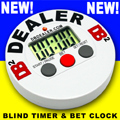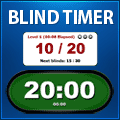|
|
Poker Ring Games(non-tournament poker) Most of the information on this website is geared towards poker tournament play. Ring games are non-tournament poker games where players may enter or leave the game at any time. A ring game may last for hours or days with many different players coming and going. A player is never really forced out of a ring game ... as long as you still have cash to buy back in! Ring games may be Texas Hold'em (Limit or No-limit), 7-Card Stud, Draw, Omaha, Pineapple or any other variant of poker that you wish to play. Many ring games are 'dealer's choice' games where the dealer chooses what variant of poker is played for that hand. You might play a hand of 7-Card Stud, followed by a hand of Draw, followed by a hand of Hold'em. You might want to set up a side table of ring games for players who bust out of your tournament. Poker Betting StructuresFixed Limit The amount of the bet or raise is pre-determined, depending on the betting round. For instance in Hold'em - $1/$2 means that you may bet or raise $1 on the first two betting rounds and $2 on the last two betting rounds. This is a common betting format for many home games. No-limit A player may bet or raise all his chips. Pot Limit A player may bet or raise any amount up to the present amount of the pot (include the amount of the call if raising). Spread Limit A player may bet or raise any amount between two other amounts. For instance, Hold'em $1-$4 Spread Limit means that a player may bet anywhere from $1 to $4 on any betting round. Mixed Limit is different bets on different rounds (1-4-4-8). Poker Table StakesA player may only bet as many chips as he had on the table at the beginning of the hand. A player may only lose as many chips as he had on the table at the beginning of the hand. A player may not add money/chips to the table during a hand. A player may not remove money from the table during a hand (except for dealer/waitress tips). Types of Poker GamesMany of the home ring games played are variations of 7-Card Stud, typically with betting limits of .50�-$1 or $1-$2 or $2-$4 or $1-$4, etc. You might also play Hold'em, Crazy Pineapple (Hold'em with three cards instead of two, one discarded after the flop) and Omaha (Hold'em with four cards, two cards from your hand must be used). Many home ring games are played as high-low split, meaning that both the high hand AND low hand split the pot. Dealer's Choice Poker GamesThe dealer chooses what variation of poker to play for that hand. The player to his left deals, and chooses the game variation, for the following hand. In some home games, the dealer chooses a game which is then played for one complete rotation around the table, The dealer deals first and last and then the deal is passed to the player to his left. Chips Needed to Play Poker Ring GamesThe poker chips needed to play ring games is somewhat similar to what is needed for tournament play. You can make do with less colors if needed, but three or four different colors is still best. You should still try to issue each player at least 30-50 chips to start with. Many ring games are played with a large amount of one or two colors and a few of a third color. Some games can be played with only two colors. You can easily play ring games with the same chipset that you purchased for tournament play. The common tournament chip distributions of (200-200-100) or (200-150-100-50) and denominations of 5, 10, 100, 500, and 100 make it easy to adapt for a ring game. You could make your ring game buyin $10 and simply divide your tournament chip values by 100. To issue each player $10 worth of chips you would give out 20 - Red (.05) chips + 16 - Green (.25) chips + 5 - Black (1) chips. If you have a $100 buyin you could give out 20 - Red (.50) + 16 - Green (2.50) + 5 - Black (10) chips. You will also have to make sure that the antes/blind structure that you use is well suited for these chip denominations. The chips needed differs greatly for each variant of poker (7-Card, Hold'em, Draw) and also depends greatly on the ante and blinds structure. A typical home game might be a $1-$2 Limit Hold'em game with a maximum $100 buyin. The small blind is .50� and the big blind is $1. You do not really need many of the .50� (small blind) chips because the only time a .50� chip is used is when the small blind folds pre-flop. All players must call in the amount of the bring-in (big blind) and the small blind player can call by simply removing the .50� chip and throwing in a $1 chip. Most raises in the game are in increments of $1 or more. You should issue fewer of the small blind valued chips (.50�) and a greater number of big blind valued chips ($1). You might allow players to buyin for between $50 and $100 and distribute something like 10(.50) + 25($1) + 4($5) for a $50 buyin to 10(.05) + 35($1) + 12 ($5) chips for a $100 buyin. If you usually have eight players who show up - you would need 80 + 200 + 32 = 312 chips. Add extra chips for additional buyins but remember that you won't really any more small blind chips, there is already enough on the table, let the players make change amongst themselves. If you have a typical tournament set of 200-200-100, you can use your group of 100 as the small blind chips and the two groups of 200 chips as the big blind and (5 times big blind) chips. If you have only 50 chips of one color, use those as your small blind chips. You can also use only two colors to play the same game. Your low valued chip would be equal to your small blind and your larger valued chip would be equal to your big blind. Make sure you have plenty of your big blind chips if you are going to do this. Many small home games use this structure. If you are buying 1000 chips for these types of games you might consider buying something like ... 100 - .50 Your chip distribution should somewhat resemble the following formula:
|
Online Poker Guide
Hand Converter
Holdem strategy
Freeroll tournaments
Poker calculator
Online poker
Poker rooms
> poker pokeren
> iDeal poker
> online casino
> iDeal casino
> casino casinos
> casino bonus
Get Bonus code Titan Poker, and full tilt poker referral code or max bonus to the full tilt referral code. Best ultimate bet referral code sign up bonus doyles room promo code or poker host bonus code























